Since the European Cup started in the 1955/56 season, there are a number different English sides who have competed in the competition. For 37 years only the champions of each country and the holders qualified for a straight knockout tournament.
From the 1992/93 campaign it was renamed the UEFA Champions League (although still playing for the same European Cup trophy) and the format added a round-robin group stage, which in turn allowed for multiple entrants from certain countries.
The English Premier League, as one of Europe’s highest ranked domestic leagues, has always had the maximum amount of teams entered in the competition. Between 1997-99, the PL runners-up also competed. This was increased to three entrants between 1999-2003, until the top 4 from the Prem were granted qualification from 2003 onwards. In the 2005/06 and 2017/18 seasons, there were actually five English clubs in the competition; this was due to Liverpool winning the Champions League in 2005 and Manchester United winning the Europa League in 2017, whilst both not finishing in the top 4 of the Premier League.
So here I rank the all those English sides by their best performances in the competition over the last 65 years. Starting with…
17. IPSWICH TOWN

Best performance: First Round – 1963
Next best: N/A
Total seasons in European Cup: 1
Following their only ever league title in 1962, Alf Ramsey’s men had early joy in their sole European Cup campaign. A 14-1 aggregate win in the preliminary round over Maltese champions, Floriana, saw them pitched against Italian giants, AC Milan, in the First Round proper. Unfortunately, the San Siro side that included Giovanni Trapattoni and Cesare Maldini, proved too much for the Tractor Boys, running out a 4-2 aggregate win.
Ramsey left Portman Road a month later to take the England job, and we all know what happened there. Ipswich narrowly missed out on another qualification for the Champions League in 2001, finishing just 3 points behind third placed Liverpool.
16. BLACKBURN ROVERS

Best performance: Group Stage (Last 16) – 1996
Next best: N/A
Total seasons in European Cup: 1
If you want know how not to play in the Champions League, then look no further than the 1995/96 campaign of English champions, Blackburn Rovers. Manager Kenny Dalglish moved upstairs after guiding Rovers to their first league title in 81 years, with his assistant Ray Harford, taking the reins. The honeymoon period didn’t last long for Harford however, as Blackburn lost four out of their six group matches, including a 3-0 defeat in Spartak Moscow, where teammates Graeme Le Saux and David Batty infamously started fighting each other mid-match.
Despite finishing bottom of a group containing Spartak, Legia Warsaw and Rosenberg, there was one plus point from their only Champions League experience. Striker Mike Newell set the record for the fastest hat-trick scored in the CL era, netting 3 times in 9 minutes during Blackburn’s 4-1 victory over Rosenberg in their final group game – a record that stood for 16 years.
15. NEWCASTLE UNITED
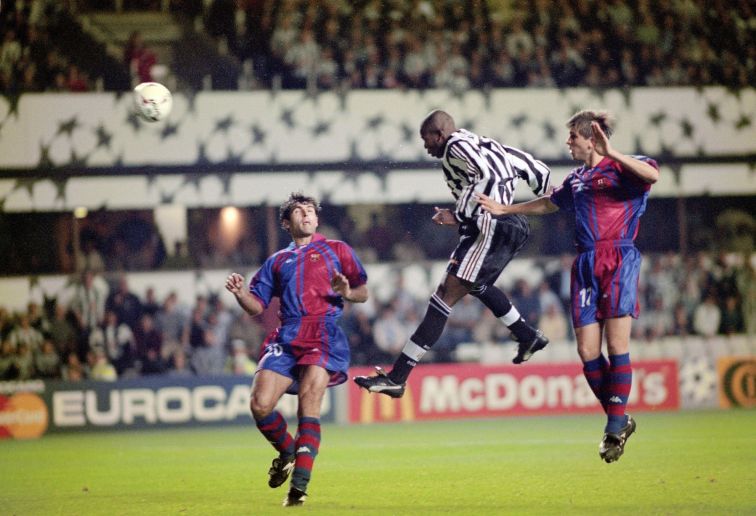
Best performance: Second Group Stage (Last 16) – 2003
Next best: Group Stage (Last 24) – 1998
Total seasons in European Cup: 3
Newcastle were the first English beneficiary from two teams per country being able to qualify, as they finished Premier League runners-up in 1997. Under Kenny Dalglish, the Magpies just missed out in the group stage on a quarter-finals place to PSV Eindhoven, but not before they produced a famous night at St James’ Park, beating the mighty Barcelona 3-2 with a Faustino Asprilla hat-trick.
In the noughties, Sir Bobby Robson led them to their most successful Champions League campaign in 2003, after being drawn in a tough group with Inter Milan and Barcelona again. Robson was surprisingly sacked a year later and the Toon Army have not hit those heights since.
13= LEICESTER CITY

Best performance: Quarter-Finals – 2017
Next best: N/A
Total seasons in European Cup: 1
So soon after Leicester’s unbelievable title triumph, there was a small matter of the Champions League to deal with. Despite not starting the domestic season well, Claudio Raneri’s men qualified for the knockout stages with relative ease, finishing top of a group that contained Porto, Copenhagen and Club Brugge. As the round of 16 got underway, Leicester lost 2-1 away to Sevilla, but before the second leg could take place, Raneri was sacked by the Leicester board.
His assistant, Craig Shakespeare, took charge as caretaker manager and immediately turned his side’s fortunes around, as Leicester beat Sevilla 2-0 in the return leg to send them through to the quarters. In the last eight they bravely fought against Atletico Madrid, but were eliminated 2-1 on aggregate. Those European nights at the King Power stadium are remembered as fondly by Foxes fans as any of their PL wins the season before. In the end, Leicester actually went further in the Champions League than any other English team in 2017.
13= BURNLEY

Best performance: Quarter-Finals – 1961
Next best: N/A
Total seasons in European Cup: 1
Managed by former player, Harry Potts, Burnley probably enjoyed their most successful period in the early sixties, winning only the second league title in the club’s history in 1960. The European Cup proved a much tougher task the following year, as Burnley scraped past French side Stade Reims in the first round 4-3 on aggregate.
In the quarters they faced Hamburg, and the Clarets impressively won the first leg 3-1 at Turf Moor. Unfortunately the return leg in Germany didn’t go to plan and one of the best German strikers of all time, Uwe Seeler, scored twice in a 4-1 victory for Hamburg to send them through to the semis.
With crowds of over 40,000, half of the town came to watch Burnley on those European nights. Incredible.
12. EVERTON

Best performance: Quarter-Finals – 1971
Next best: Qualifying Round – 1964, 2006
Total seasons in European Cup: 3
Everton fans can definitely feel hard done by on this list, as arguably their greatest team which won the league in 1985 and ’87, missed out on European football during the Heysel ban, which you can read more about here. The Toffees’ first attempt at the Europe’s premier prize finished all too quickly in the 1963/64 season, as they lost to Inter Milan in the preliminary round.
The 1971 competition turned out to be their best campaign as they easily dispersed of Icelandic side, Kelafnik, in the first round and then beat Borussia Monchengladbach in the first ever European Cup penalty shootout – even after Joe Royle had missed the first pen. Everton were now favourites for the cup, but surprisingly went out in the quarters to Greek oufit, Pananthinaikos, on away goals.
In their only other appearance, Everton went out 4-2 on aggregate in the third qualifying round of the 2006 competition to the Spaniards, Villarreal. The European Cup will always be a sore point with Everton fans though, as that side from the 80s could have been a real force.
11. WOLVERHAMPTON WANDERERS

Best performance: Quarter-Finals – 1960
Next best: First Round – 1959
Total seasons in European Cup: 2
It’s often forgotten, but at the end of the fifties, Wolves were the best team in the country. Two consecutive league titles in 1958 and ’59 even prompted their great leader, Billy Wright, to retire on top from the game he loved. Wright played in their first European Cup campaign, which ended in a disappointing first round defeat to Schalke 04.
But their inspirational captain had hung up his boots before the 1959/60 season, which makes it even more surprising that Wanderers made it to the quarter-finals. Victories over Vorwarts Berlin and Red Star Belgrade set up a massive tie in the last 8 against Barcelona. However, this is where Wolves’ European Cup dream came to an end, as a 4-0 defeat in the Nou Camp was followed by a 5-2 loss at Molineux, to make it a 9-2 drubbing on aggregate. What a way to get dumped out of Europe.
10. DERBY COUNTY

Best performance: Semi-Finals – 1973
Next best: Second Round – 1976
Total seasons in European Cup: 2
The start of Brian Clough’s love affair with the European Cup began at the Baseball Ground. In 1972, Clough, along with his assistant Peter Taylor, led Derby to their first ever league championship and the drama would continue in Europe the following season.
The campaign started well, with comfortable victories over Yugoslavian outfit, Zeljeznicar and Benfica in the first two rounds. Czechoslovakian side, Spartak Trnava, proved a sterner test, as the Rams scraped past them 2-1 on aggregate.
The semi-final tie against Italian giants Juventus would last long in the memory of fans and Clough in particular, who after losing the first leg 3-1 in Turin, was insistent his team had been cheated, following reports of Juventus players entering the referees dressing room before the game and at half-time. The return leg at home leg ended as a 0-0 draw, meaning Derby were eliminated to the Turin side which included Dino Zoff and Fabio Capello. Brian Clough, however, would have his day in Europe.
Three seasons later Derby were back, with one of Clough’s former players, Dave Mackay now in charge. Unfortunately they suffered a second round knockout to Spanish champions Real Madrid, in one of the greatest comebacks in the competition. A 4-1 win at The Baseball Ground looked to have secured a place in the quarter-finals, but Madrid ran out 5-1 winners at the Berbabeu, and Derby never returned to the European Cup.
9. MANCHESTER CITY

Best performance: Semi-Finals – 2016
Next best: Quarter-finals – 2018, 2019, 2020
Total seasons in European Cup: 10
Long before the millions were pumped into Man City, they had one attempt at European Cup glory after winning the league title in 1968. Joe Mercer’s great side of the late sixties were one of the favourites for the trophy, but bowed out in the first round, losing 2-1 on aggregate to Fenerbache. City fans had to wait until the 2011/12 campaign for another crack at Europe’s top prize and have been involved in it every season since.
However, it wasn’t until 2016 that they made an impact on the competition. Topping a group that featured Juventus, Sevilla and Borussia Monchengladbach, Manuel Pellegrini’s men beat Dynamo Kiev and Paris Saint Germain in the knockout rounds, to set up a massive semi-final tie with Real Madrid. A tight first leg at the Etihad finished 0-0, but City also failed score in the second leg in Spain and lost on 1-0 to a Fernando own goal.
Pep Guardiola soon took over as manager, but has failed to get his side past the quarter-final stage. With Manchester City’s dominance in the domestic competitions though, you have to think that it will only be a matter of time before the get their hands on that famous trophy.
8. TOTTENHAM HOTSPUR
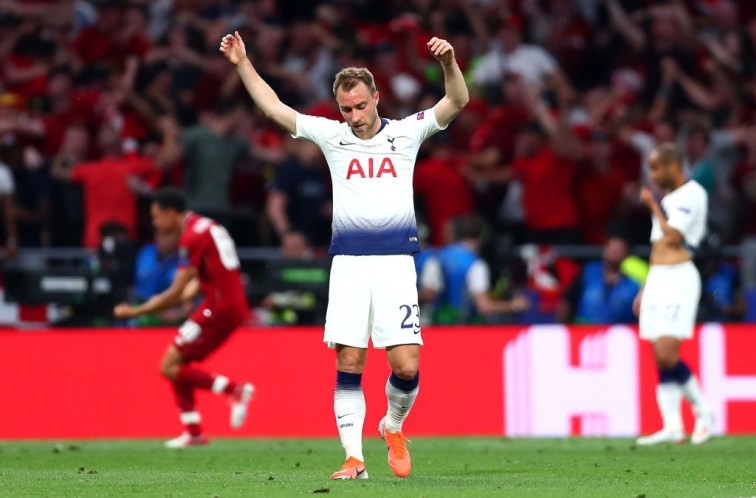
Best performance: Finalists – 2019
Next best: Semi-Finals – 1962
Total seasons in European Cup: 6
In 1962, Bill Nicholson’s famous double winning Spurs team so nearly added the European Cup to their trophy haul. Victories over Polish side Gornik Zabrze, Feyenoord and Dukla Prague meant Tottenham faced the European champions Benfica in the semis. A young Eusebio helped Benfica to a 4-3 win and they would retain the trophy by beating Real Madrid in the final. Fast forward 48 years and Spurs qualified again by finishing 4th in the Premier League.
Under Harry Redknapp they reached the quarter-finals 2011, a run which included the emergence of Gareth Bale – before being trounced 5-0 on aggregate by Real Madrid.
Last year, Tottenham reached the final by beating Manchester City and Ajax in the quarters and semis, in two of the most dramatic Champions League matches you will ever see. In the last eight a VAR decision correctly ruled out an injury time City goal, which would have knocked Spurs out and at the semi-final stage, striker Loucas Moura completed a memorable hat-trick in injury time to give Tottenham a 3-2 victory on the night and send them through on away goals.
The final itself was disappointing for Spurs, as Liverpool cruised to a 2-0 victory. But with a fantastic new stadium finally finished, Tottenham are now firmly established as one of the biggest clubs in England and will be pushing for many more finals in the years to come.
7. ARSENAL
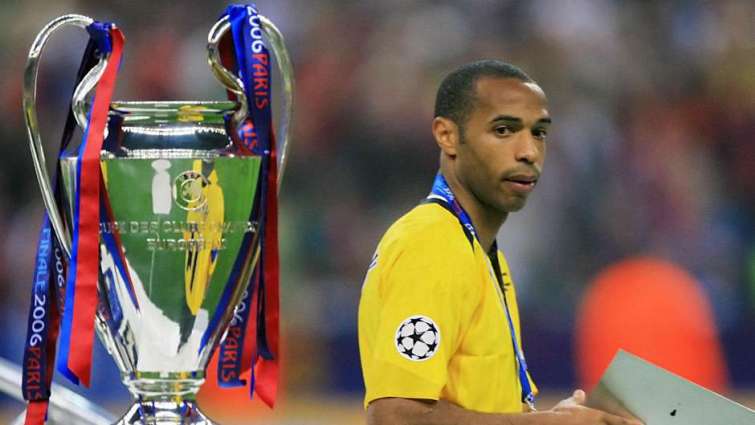
Best performance: Finalists – 2006
Next best: Semi-Final – 2009
Total seasons in European Cup: 21
With an identical final and semi-final record as their local rivals, Arsenal rank just above Spurs as they have reached the quarter-finals on four more occasions than Tottenham. The double winning side of 1971 had the Gunners’ first crack at the European Cup and they reached the quarter-finals, where they lost to a Johan Cruyff inspired Ajax.
Apart from a short spell in the 1991/92 competition under George Graham, the rest of Arsenal’s history in the Champions League can be summed up in two words; Arsene Wenger.
From 1998, Wenger guided his Arsenal side to 19 consecutive seasons in the CL, more than any other English club – Manchester United did 18 seasons on the trot from 1996. However, their record isn’t the greatest. Under Wenger, the Gunners made four quarter-finals, one semi-final and the final itself once in 2006.
A packed Stade de France in Paris saw Arsenal come desperately close to their first European Cup trophy that night, despite goalkeeper Jens Lehmann being sent off after just 18 minutes. Incredibly Arsenal went in at half time 1-0 up following a Sol Campbell header and hung on to that lead until 14 mins from time, when the introduction of Henrik Larsson turned the game on it’s head. His two assists for Samuel Eto’o and Juliano Belletti gave Barcelona a 2-1 win and Arsenal went home empty handed.
The break-up of the 2004 ‘Invincibles’ began after this final and apart from a semi-final appearance in 2009, the north London side have not been as close Champions League glory since.
6. LEEDS UNITED

Best performance: Finalists – 1975
Next best: Semi-Finals – 1970, 2001
Total seasons in European Cup: 4
Leeds may have only been involved in four European Cup campaigns, but every single one has been eventful. In 1970, Don Revie’s side had a comfortable path to the semi-finals, beating Norwegian minnows Lyn (16-0 on aggregate), Ferencvaros and Standard Liege. There they faced a great Celtic team who had won the competition three years previously and were eliminated 3-1 on aggregate.
Five years later was Leeds’ biggest chance as they reached the final, but the match is still spoken about now for all the wrong reasons. United faced a Bayern Munich side filled with German World Cup winners from the year before, including top scorer Gerd Muller and captain Franz Beckenbauer.
In fact it was Beckenbauer who was in the middle of the controversy, as Leeds had two blatant penalty appeals turned down in the first half, after he first handled the ball in his own area and then tripped striker Allan Clarke in the box. In the second half the madness continued, when Peter Lorimer had a goal that seemed to be given initially by the referee, but following Beckenbauer’s protests was disallowed. Two counter attack goals from Franz Roth and Muller cruelly took the match away from the Yorkshire side and the 2-0 final score prompted rioting in the stands from Leeds fans – leading to a European ban for the club for 4 years.
In the 1992/93 season Leeds played in the first newly named Champions League and went out to Stuttgart on away goals. However, the German side were ruled to have fielded an ineligible player and a play-off match was ordered between the sides in Barcelona, which Leeds won 2-1, thanks to a famous strike from Carl Shutt. This led to another ‘Battle of Britain’ match against Scottish champions Rangers in the second round, which Leeds lost 4-2 on aggregate.
Another memorable campaign followed in 2000/01, when David O’Leary’s side reached the semi-finals, enjoying some glorious European nights at Elland Road along the way, before eventually losing 3-0 on aggregate to Valencia. This run ultimately led to the downfall of Leeds, as they began to spend beyond their means to try and stay in the Champions League. When they didn’t qualify the next season, debts started to mount, players began to leave and the club were relegated in 2004. They’ve not been back to the big time since.
5. ASTON VILLA

Best performance: Winners – 1982
Next best: Quarter-Finals – 1983
Total seasons in European Cup: 2
The last thing you expect halfway through a European Cup campaign is the resignation of your manager. Well this is exactly what happened to Aston Villa. After guiding his team to their first league title in 71 years, Ron Saunders could do no wrong at Villa Park.
Even after a disappointing title defence in the First Division, Villa were in the quarter-finals of the European Cup, which was now their main focus. However, following a very public contract dispute with his chairman, Saunders rocked the football world by resigning in February 1982. Protests by fans to reinstate him were short-lived, as just 9 days later Ron Saunders took the manager’s position at local rivals Birmingham City!
Villa installed his assistant, Tony Barton, as their new manager and never looked back, beating Dynamo Kiev 2-0 on aggregate in the quarters, before a tense 1-0 aggregate win over Anderlecht in the semis, which was overshadowed by crowd trouble in the Villa end. In fact UEFA nearly threw the midlanders out of the competition, before the UK minister of sport pleaded with officials to let the result stand.
The final against Bayern Munich didn’t start great for Aston Villa, as number one goalkeeper Jimmy Rimmer came off injured after 9 minutes, to be replaced by Nigel Spink for only his second ever appearance. It just so happened that Spink had the game of his life, with the amount of saves he made going well into double figures. With Villa riding their luck at the back, striker Peter Withe’s goal on 67 mins proved to be the winner, making this the sixth year in a row that an English team took the trophy home.
This trend stopped the year after however, as Villa were knocked out of the competition in the quarter-finals by a Michel Platini influenced Juventus. Still that evening in Rotterdam in 1982 remains the greatest night in Aston Villa’s history.
4. CHELSEA
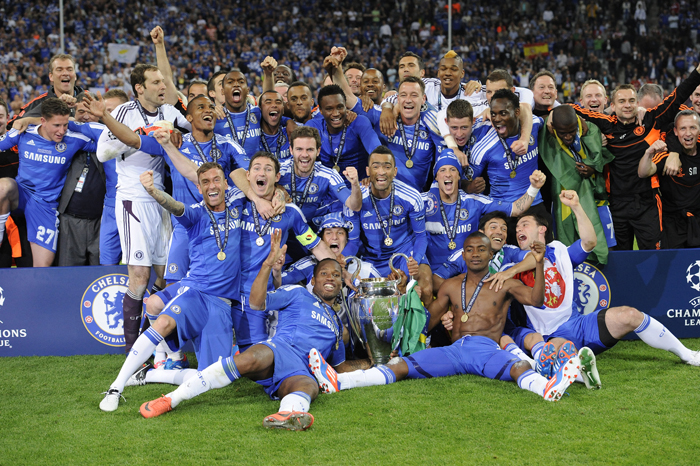
Best performance: Winners – 2012
Next best: Finalists – 2008
Total seasons in European Cup: 16
Chelsea fans had to wait until the 1999/2000 season for a seat at the top table of European football, qualifying for the first time by finishing 3rd in the Premier League. Since then they have consistently reached the knockout stages of the tournament, (including making the semi-finals on five occasions) but Chelsea’s Champions League highlights are really the tale of two penalty shootouts.
In 2008 they played in the first ever all-English final against Manchester United, where goals from Cristiano Ronaldo and Frank Lampard ensured the game finished 1-1 and would be decided on penalties. Following a miss from Ronaldo, captain John Terry had the chance to win the trophy from the spot, but slipped in the Moscow rain and his penalty hit the post and went wide. The shootout went to sudden death and after Ryan Giggs scored his kick, United keeper Edwin Van Der Sar made the all important save from Nicolas Anelka to give the Red Devils their second European Cup trophy.
Four years later, Chelsea were back in the final against Bayern Munich, which was actually played in Bayern’s home ground, the Allianz Arena. Caretaker manager Roberto Di Matteo had overseen a superb semi-final aggregate victory over Barcelona in the Nou Camp, but skipper Terry was sent-off and suspended for the final, although you wouldn’t have known with his celebrations afterwards. After dominating the game, Thomas Muller gave the Germans the lead in the 83rd minute, only for Didier Drogba to equalise with just 2 mins left on the clock, with an outstanding header.
In extra time, Bayern were awarded a penalty following a foul from Drogba, but Chelsea keeper Petr Cech saved Arjen Robben’s spot kick to send the match into another shootout. Juan Mata’s weak pen was saved by Manuel Neuer to give Bayern the advantage, until Ivica Olic and Bastian Schweinsteiger missed their fourth and fifth kicks, allowing that man Drogba to steal the headlines again as his penalty sent Neuer the wrong way. Chelsea got their first ever Champions League win and owner, Roman Abramovich, the trophy he had been pining for since taking over the club.
3. NOTTINGHAM FOREST
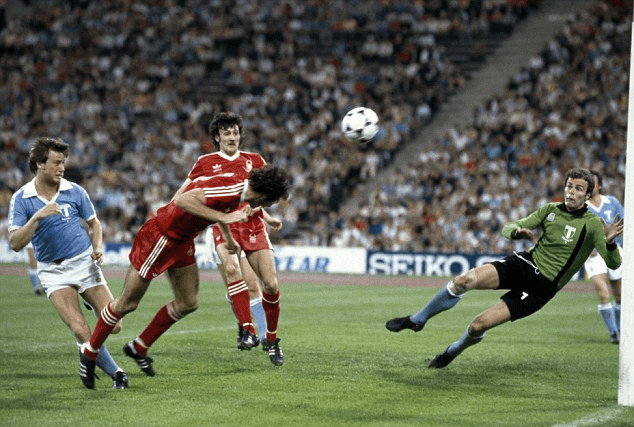
Best performance: Winners – 1979, 1980.
Next best: First Round – 1981
Total seasons in European Cup: 3
When people talk about Leicester City’s Premier League title triumph as being the greatest story in English football history, they may be slightly overlooking the achievements of their east midland rivals, Nottingham Forest. Brian Clough’s men gained promotion to the First Divison in 1977, won the league championship in 1978, and followed that by winning the European Cup in 1979 and ’80. Still an unprecedented rise.
In their first game on the continent, they were drawn to play the two-time defending champions and First Division rivals Liverpool in an all-English first round tie. Forest surprised many by beating the Anfield side 2-0 on aggregate, with goals from Colin Barrett and Garry Birtles – who was making only his third appearance for the club after a move from non-league side, Long Eaton United. Beating arguably the best side in the tournament in the first round gave Forest a major confidence boost and easy victories in the next two rounds over AEK Athens and Grasshopper Zurich followed. A tight semi-final against FC Koln almost ruined Clough’s European dream, before an Ian Bowyer goal in Germany gave his side a 4-3 win on aggregate.
The English side were heavy favourites for the final against Swedish champions Malmo in the Olympiastadion, Munich, but the match itself was highly uneventful. Brian Clough gave a European debut to Britain’s first million pound footballer, Trevor Francis, albeit out of position on the right wing. However, it was from that position where Francis came in and headed a John Robertson cross into the roof of the net. Clough was justified in his selection as that goal was enough and Nottingham Forest (who were in the second tier two years earlier) won their first European Cup.
The following season Forest pushed on further to try and retain the trophy, dispatching Swedish side Oster, Arges Pitesti of Romania and East German outfit BFC Dynamo, before another tight semi-final win, this time 2-1 on aggregate over Ajax.
The 1980 final was against much tougher opposition than the year before, with Forest definitely the underdogs this time against Hamburg, who had European Footballer of the Year, Kevin Keegan, in their ranks. The match in Madrid saw Forest take the lead after 21 minutes, winger John Robertson now turning from goal provider to goal scorer, as his shot squeezed past Hamburg keeper, Rudolf Kargus. Despite Keegan having much of the ball, the Tricky Trees held on to achieve back-to-back European Cups. The victory also meant Forest became the first club to win the European Cup more times than their own domestic first division; a record that still stands.
Back for a third attempt in the 1980/81 campaign, Forest unfortunately fell at the first hurdle, losing 2-0 on aggregate to CSKA Sofia. Having seen footage of Brian Clough’s interview afterwards, he was not a happy bunny. With Nottingham Forest though, Clough fulfilled his European ambitions and his side have one of the best ratios of winning the competition, lifting the trophy twice in three campaigns. Not bad for a supposedly small club from the East Midlands.
2. MANCHESTER UNITED
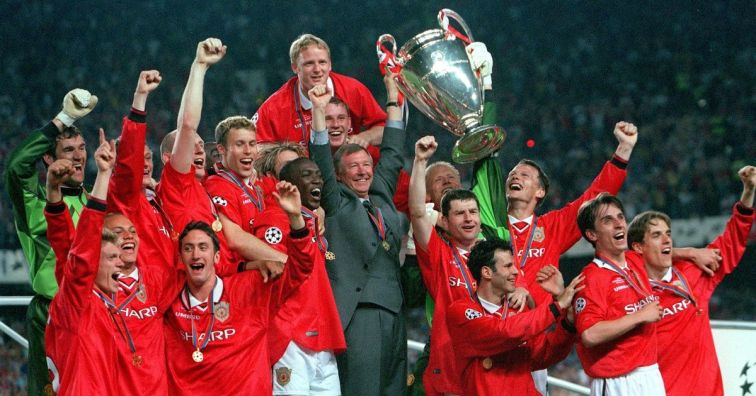
Best performance: Winners – 1968, 1999, 2008.
Next best: Finalists – 2009, 2011.
Total seasons in European Cup: 28
With more seasons in Europe’s premier competition than any other English team, Manchester United just miss out on the top spot by their amount of cup wins.
The Munich air disaster in 1958, totally overshadows United’s first attempts to win the trophy. Twenty-three people lost their lives as a plane carrying players, staff and journalists crashed on a take off attempt as it stopped for fuel in Munich on the way back from Belgrade; eight players and three staff were among the dead.
Ten years after the tragic event, United made it to the European Cup final at Wembley against Benfica. The match became a very emotional affair for manager Matt Busby (who nearly died in the crash), as it marked the culmination of 10 years of Manchester United rebuilding. Players Bobby Charlton and Bill Foulkes, who had also both survived, played in the final. Charlton opened the scoring for United 8 mins into the second half, before Jaime Graca equalised for Benfica to send the game into extra time. Busby’s men then stepped up a gear and goals from George Best, Brian Kidd and Charlton again rounded off a wonderful 4-1 victory to give Manchester United their first European Cup.
United’s failure to win a league title for 26 years meant they missed out on further European Cup football until 1993, when Alex Ferguson’s side won the inaugural Premier League. It wasn’t until 1999 however, that United made another appearance in the final, where they faced Bayern Munich at the Nou Camp in Barcelona. A fantastic 4-3 aggregate win over Juventus in the semi-final came at a cost, as both Paul Scholes and captain Roy Keane were suspended for the final.
The match itself couldn’t have started any worse for United, when Mario Basler scored a low free kick on just 6 minutes. Ferguson’s men struggled for most of the game, as Bayern came close to adding a second when Mehmet Scholl’s chip came back off the post into Peter Schmeichel‘s grateful arms, before an overhead kick from Carsten Jancker smashed against the crossbar. As the match went into injury time, the world watched probably the greatest ending to a final ever.
A David Beckham corner that wasn’t cleared fell to Ryan Giggs, whose weak shot was slotted home by substitute Teddy Sheringham. Just 90 seconds later United had another Beckham corner, and Sheringham’s header was tapped home by the other substitute striker, Ole Gunnar Solskjaer. Cue pandemonium in the stadium. Bayern players collapsed on the floor, stunned to have lost a game they thought they’d won. UEFA had even already tied Munich ribbons to the trophy, but they were duly removed by the time Schmeichel lifted the famous cup in his final appearance for United.
As written earlier on, the 2008 final between Manchester United and Chelsea was United’s third European Cup win. The following year and in 2011, the Red Devils played in two more finals, both against Barcelona and both unfortunately ending in defeat. The difference in both games was undoubtedly the genius that is Lionel Messi.
A header in 2009 secured a 2-0 win over United in the San Siro and a twenty yard strike in 2011 helped Barca to a 3-1 win at Wembley. Victory in both these finals could’ve put Manchester United in the same bracket as the great European teams to have won the competition on five or more occasions. But there’s only one English side in that illustrious club…
1. LIVERPOOL

Best perfomance: Winners – 1977, 1978, 1981, 1984, 2005, 2019
Next best: Finalists – 1985, 2007, 2018
Total seasons in European Cup: 24
If you didn’t already know, Liverpool are England’s most successful club in European Cup history, competing in nine finals overall. Their first four triumphs came during a period of dominance for English clubs in the competition. Between 1977-84, the trophy only left our shores once, with Liverpool winning it the most.
The 1977 final pitted the Reds against Borussia Monchengladbach in Rome and with goals from Terry McDermott, Tommy Smith and Phil Neal, they lifted their first European Cup in a 3-1 victory.
That was Kevin Keegan’s final match for Liverpool and the following year his replacement, Kenny Dalglish, led the club to a second successive cup, scoring in the 1-0 win over Club Brugge at Wembley.
After a couple of Nottingham Forest wins, Liverpool were back in the final in 1981 and won their third European Cup, with Alan Kennedy scoring in a famous 1-0 win over Real Madrid in Paris. This meant Bob Paisley became the first manager to win the European Cup on three occasions.
In 1984, Liverpool faced Roma, in Rome at the Stadio Olympico, which was practically an away game for the Reds. Phil Neal gave the Reds the lead in the 13th minute, only for Roberto Pruzzo to equalise just before half time. The match went to extra time, which provided little action and in the end a penalty shootout was needed to separate the teams. Steve Nicol blazed his kick over the crossbar, but Bruno Conti also skied his in the next round of penalties. For Roma’s fourth pen, Liverpool goalkeeper Bruce Grobbelaar decided to wobble his legs in hope of distracting Francesco Graziani. It worked and the Italian fired his spot-kick over the bar. This gave Alan Kennedy the chance to be the hero again for Liverpool and his penalty was expertly dispatched to win Liverpool their fourth European Cup.
The following year tragedy struck in the final, as Liverpool lined-up against Juventus at the Heysel stadium, in Brussels. Before the match trouble broke out in the terraces, with some Liverpool fans breaching a fence that separated supporters and started charging at Juventus fans. The resulting weight of people caused a retaining wall to collapse, killing 39 and injuring hundreds more. The match still went ahead and Liverpool lost 1-0 to a Michel Platini penalty, although the result was irrelevant. The disaster prompted UEFA to ban English clubs from European football for 5 years.
The ban and lack of domestic success meant Liverpool didn’t play in the European Cup again until the 2001/02 season. It was in 2005 however, when Rafa Benitez brought the trophy back to Anfield. A controversial 1-0 aggregate win over Chelsea in the semi-finals sent Liverpool to Istanbul, where they faced AC Milan in the final.
Despite the confident build-up, Milan hammered the English side in the first half, going in at half-time 3-0 up. What followed was the most memorable comeback in European Cup final history. Just after the break, captain Steven Gerrard led by example by heading home to claw one back and soon afterwards they had a second, Vladimir Smicer’s long range effort going through the hands of Milan keeper, Dida. Just three minutes later the comeback was complete. A now inspired Gerrard was brought down in the box and Xabi Alonso tucked home the rebound from his saved penalty. Liverpool hung on as keeper Jerzy Dudek made a number of fantastic saves to keep Milan at bay and the match went to another penalty shootout.
Serginho and Andrea Pirlo missed the first two penalties for Milan, but John Arne Rise missed for Liverpool to narrow the advantage to one pen. With every other penalty scored it was down to striker Andriy Shevchenko to keep the Italian side in the tie, but Dudek had other ideas, copying Grobbelaar’s wobbly legs routine with success and saving the pen to give Liverpool their fifth European Cup trophy.
A repeat of the final happened two years later in Athens, only this time Milan got their revenge in a 2-1 victory.
In 2018, Jurgen Klopp’s Liverpool team got to the final through their exciting attacking flair, but were undone 3-1 in Kiev by Real Madrid – goalkeeper Lorus Karius was at fault for two of the goals, with an outstanding overhead kick from Gareth Bale in between for good measure.
Last season however, captain Jordan Henderson got his hands on the trophy, as Liverpool beat Tottenham Hotspur 2-0 with goals from Mo Salah and Divock Origi. The trophy was perhaps won in the semi-final, when despite losing the first leg 3-0 in the Nou Camp, Liverpool destroyed Barcelona 4-0 at home in one of the greatest matches ever seen at Anfield.
That ground has witnessed many magical European nights over the years and this clearly influences Liverpool’s chances in the competition that they hold so dear. No club in Europe ever wants to go there in the Champions League and who can blame them.
For more nostalgic articles and football memories, visit…
- Facebook: Stu’s Football Flashbacks
- Twitter: @stusfootyflash
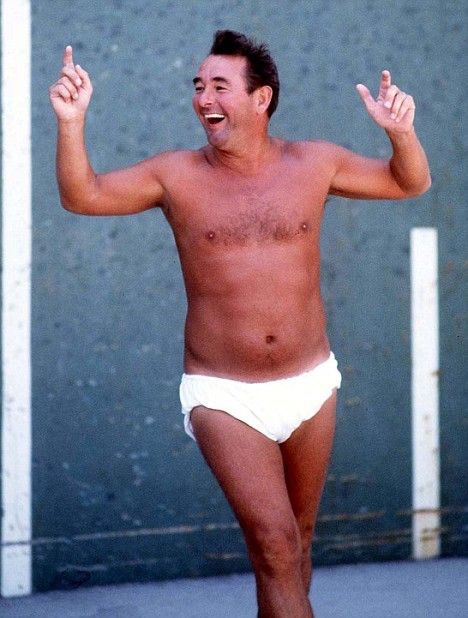


Hi Stuart – hope you and the family are well.
Another excellent piece – imaginative, well-argued and certainly thought provoking (sorry if that makes me sound like a school teacher, which was not my intention!) but such was my enjoyment I’ve read it three times.
Suffice to say, such a good piece of writing would not be out of place in the better football sections of our national press.
Great stuff mate – well done.
Regards
Neil
LikeLiked by 1 person
Neil, I have just been able to sit down today to read this as it’s been my daughters christening this afternoon. Thank you so much for your more than kind words. That’s definitely the biggest complement I’ve had so far. Your words always means a lot but this is pretty special. I look forward to your next piece too. Speak soon mate.
LikeLike